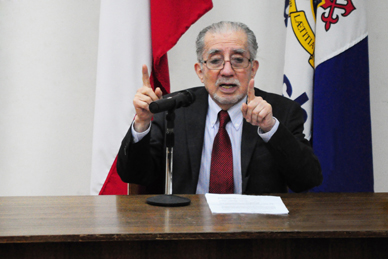- In a presentation given at Universidad de Santiago a few days ago, Iván Núñez Prieto, recipient of the National Award of Education 2015, emphasized that he still shares “the utopia” that education contributes to “build a fairer and more caring society, regardless of the fact that it may be a difficult task that requires many years, and maybe, there have been some mistakes in viewing the difficulties at its implementation.” The renowned researcher and state professor of History, Geography and Civic Education addressed these issues in his presentation “Two moments at teacher training in Chile: 1928 and 1974: Present echoes.”
On October 28th, at the Armando Quezada Auditorium, the recipient of the National Award of Education 2015, Iván Núñez, gave the presentation “Two moments at teacher training in Chile: 1928 and 1974: Present echoes.” The activity was organized by the Faculty of Humanities and the Department of Education of Universidad de Santiago in the context of the Teachers’ Day celebration.
Professor Núñez was presented by Dr Jorge Rueda, Vice-Dean for Academic Affairs of the Faculty of Humanities. The director of the Department of Education, Dr Saúl Contreras also addressed the audience.
Dr Rueda emphasized the role of education as the driving force for human development and better communal living, in the midst of the individualistic and discriminatory society of current days, as well as the educational role that our university has played through the School of Arts and Crafts, the Pedagogical Institute and the State Technical University (UTE, in Spanish).
For his part, Dr Contreras highlighted the importance of the visit of professor Núñez at a critical time for Chilean education, as well as the contributions made by the university to teacher training, one of the core components of the university development.
Inconsistent development
Professor Núñez started by mentioning that the development of Chilean education has not been progressive or linear: it has moved forward and backward through history.
In his presentation, he deeply analyzed two significant moments in the history of teacher training: the closure of teacher training schools (escuelas normales, in Spanish), for different reasons, in 1928, under Carlos Ibáñez del Campo’s dictatorship (1927-1931), and in 1974, under General Augusto Pinochet’s regime.
He reminded the audience that teacher training schools started in 1842, when they were created by the Argentinean Domingo Faustino Sarmiento, under the conservative oligarchic government of Manuel Bulnes, who was able to recognize the importance of peoples’ training. Bulnes founded Universidad de Chile, among others. The first escuela normal was located in the vicinity of Matucana Street.
At that time, teachers did not only receive free training but they had free accommodation and free meals, though they were separated by sex. In return, the had to work for seven years at public schools, but many did not fulfill that commitment and engaged in other crafts and professions.
The first rebellion
He said that later, the saltpeter boom allowed bringing a group of German teachers at the beginning of the 20th century. At the same time, a combative teachers association was created. They criticized teacher training as they considered it “authoritarian.” Núñez remembered that one of its weaknesses was pedagogical training.
In 1928, there were 15 escuelas normales. Under the pressure of teachers grouped together in the General Association of Teachers (AGP, in Spanish) for an “integral reform of Chilean education”- the escuelas normales included- Ibáñez decided to close them (he closed the Pedagogical Institute of Universidad de Chile too) and appointed its principal leaders to the Ministry of Education, “so that they could implement the reform” that they were demanding.
Although this situation did not last long, as the Government in the end decided to appoint a “commission of experts” to solve the problems, many of the association’s demands were subsequently taken up. For example, the minimum requirement to enter the school changed from four to six years of primary education.
The 60’s
During the following years, the escuelas normales increased their number, but they underwent some changes, especially in the 60’s, during the Education Reform of President Eduardo Frei (1964-1970), when the requirement to enter the school was completing secondary education. Although there was a co educational boarding school in Chillán, the boarding facilities were closed for financial reasons. On the other hand, an evening teacher training school was created at that time.
After the military coup, when there were more than twenty public and private (owned by the Catholic Church) escuelas normales, General Pinochet closed them for considering them “a focus of rebellion.”
The dictatorship imposed that, from then on, teacher training was to be part of university education. In spite of its controversial nature, professor Núñez considers that this action established “a common institutional framework, with the most similar bases possible.” In 1976, during the dictatorship, professor Núñez was detained and tortured.
He concluded by saying that, for his part, he still shares “ the utopia” that education contributes to “build a fairer and more caring society, regardless of the fact that it may be a difficult task that requires many years, and maybe, there have been some mistakes in viewing the difficulties at its implementation.”
“History has left us a few things and, in the midst of the battle of daily life, we should take a look at them,” he finally said.
Translated by Marcela Contreras



